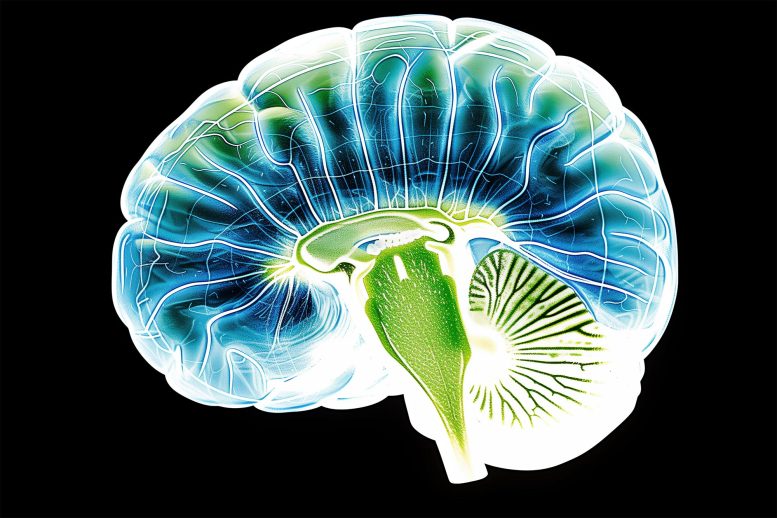
Recent research from the University of Otago has demonstrated that kiwifruit, a rich source of vitamin C, can quickly enhance mood and vitality, showing effects in as little as four days. The study, which involved 155 adults with low vitamin C levels, utilized smartphone surveys to track improvements in mood, vitality, and overall well-being. The findings underscore the benefits of incorporating nutrient-rich foods like kiwifruit into one’s diet for mental health and introduce a novel approach to nutritional research. Credit: SciTechDaily.com
Kiwifruit has proven itself as a powerful mood booster and new research from the University of Otago has shown just how fast its effects can be. In a study recently published in The British Journal of Nutrition, researchers found the furry fruit improved vitality and mood in as little as four days.
Research Findings and Implications
Co-author Professor Tamlin Conner, of the Department of Psychology, says the findings provide a tangible and accessible way for people to support their mental well-being.
“It’s great for people to know that small changes in their diet, like adding kiwifruit, could make a difference in how they feel every day.”
Vitamin C intake has been associated with improved mood, vitality, well-being, and lower depression, while vitamin C deficiency is associated with higher depression and cognitive impairment. However, Professor Conner says limited research has assessed how quickly mood improvements occur after introducing vitamin C supplements or whole food sources.
Study Methodology
The researchers aimed to fill that gap with an 8-week dietary intervention of 155 adults with low vitamin C.
Participants took daily either a vitamin C supplement, placebo, or two kiwifruit. They then reported their vitality, mood, flourishing, sleep quality, sleep quantity, and physical activity using smartphone surveys.
Key Outcomes
The researchers found kiwifruit supplementation improved vitality and mood within four days, peaking around 14-16 days, and improved flourishing from day 14. Vitamin C, on the other hand, marginally improved mood until day 12.
Lead author Dr. Ben Fletcher, who conducted the research as part of his Ph.D. at Otago, says understanding the nuances of when and how these effects occur day-to-day contributes to our knowledge of the potential benefits of vitamin C-rich foods and supplements on mental health.
“This helps us see that what we eat can have a relatively fast impact on how we feel.
“Our participants had relatively good mental health to begin with so had little room for improvement, but still reported the benefits of kiwifruit or vitamin C interventions,” he says.
Innovations
He adds that, while vitamin C tablets showed some improvements, the study underscores the potential synergistic effects of consuming whole foods like kiwifruit.
“We encourage a holistic approach to nutrition and well-being, incorporating various nutrient-rich foods into your diet.”
In addition to the direct implications for individuals seeking to improve their mental well-being, Professor Conner says the study introduces a novel methodology in nutritional research.
“The use of intensive smartphone surveys offers a real-time understanding of the day-to-day changes in mood-related outcomes.”
Reference: “Smartphone survey data reveal the timecourse of changes in mood outcomes following vitamin C or kiwifruit intervention in adults with low vitamin C” by Benjamin D. Fletcher, Jillian J. Haszard, Margreet C. M. Vissers and Tamlin S. Conner, 11 December 2023, British Journal of Nutrition.
DOI: 10.1017/S0007114523002787









So fixing a Vitamin C deficiency improves mood. Great.
From the study, “The original study was partially funded by Zespri International Ltd., a marketing company for kiwifruit….(coauthor) TSC (Tamlin S. Connor) joined the Scientific Advisory Board for Zespri after the completion of the project and after the original publication”. I’m sure the funding and post-study job improved the researchers mood. Tamlin sure sounds happy in the article’s quotes, “like adding kiwifruit”.
In order to balance the surrealist fruit bias of this article and study, kiwis are disgusting. By the time they get anywhere from New Zealand, they’re old, cost a fortune, burned gallons of jet fuel, and they taste bad anyway. Kiwis have low vitamin C, while oranges and especially bell peppers and guavas have double. Now somebody give me a job at the Guava Marketing Board.
To Hottan Sauer’s comment: Kiwis have more vitamin C than oranges
That is true per gram, nicely caught. However, a kiwi is much smaller. An average orange should have more vitamin C than the average kiwi. Anyone going for vitamin C, for example if you work on a galleon or at the Linus Pauling Institute and want a megadose, guava and bell pepper have much more vitamin C each and per gram than kiwi.
So, Vitamin C deficiency impairs mental health. Got it. That has nothing to do with kiwi fruit, really! Nice ad, though!